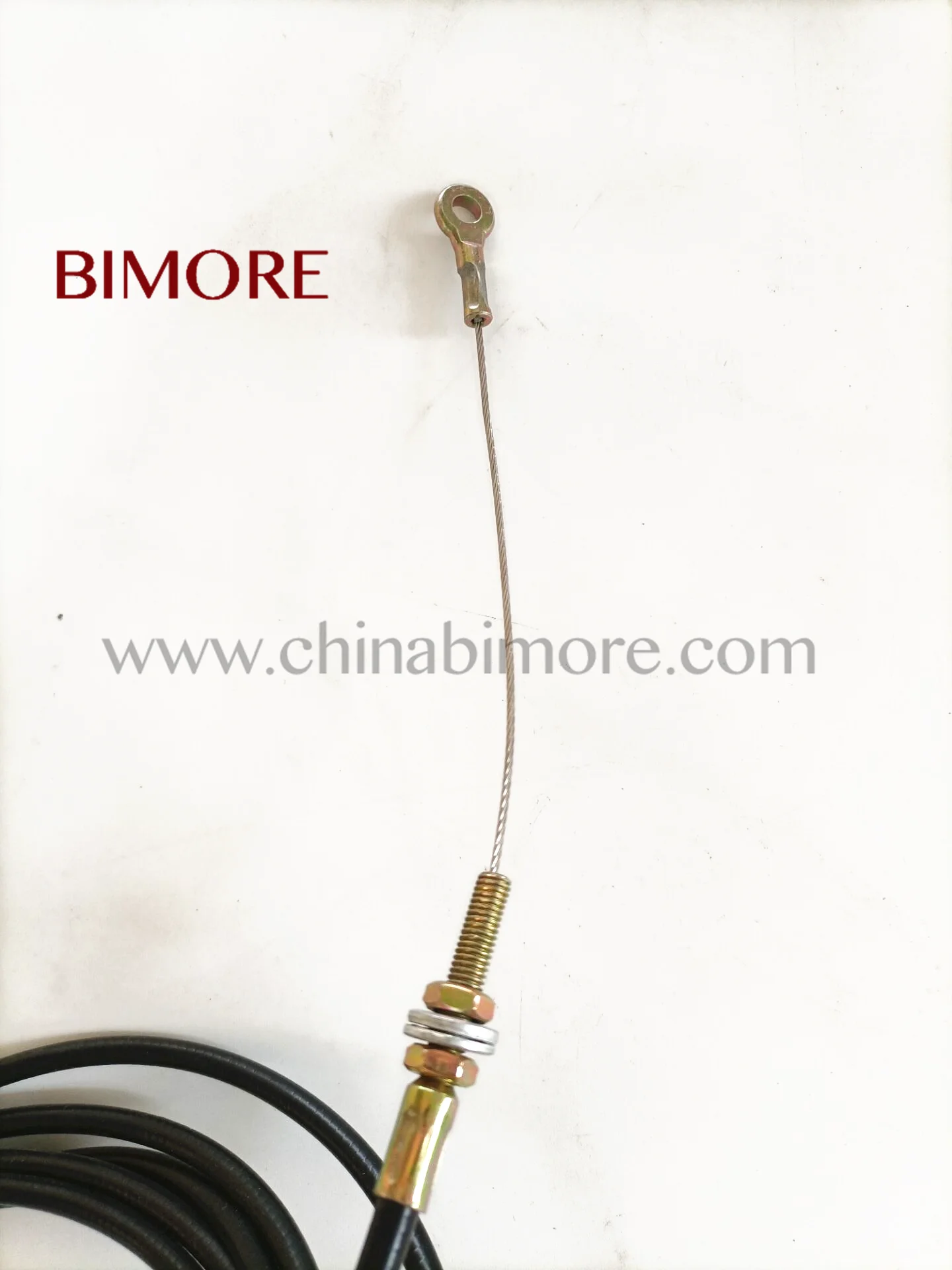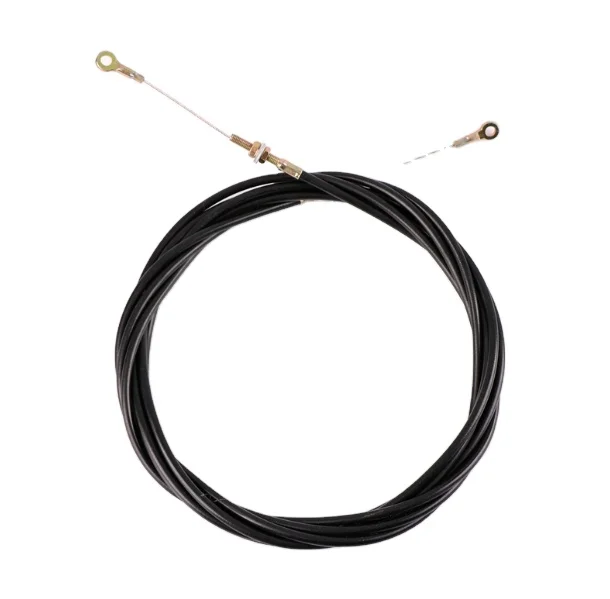
All categories
Featured selections
Trade Assurance
Buyer Central
Help Center
Get the app
Become a supplier

Customization:
With corrosion-resistant brass alloy ends and a flexible synthetic rubber body, ensure durable performance in high-moisture elevator shaft environments.
With a compact coiled design, store and deploy the cable easily during maintenance or installation, reducing workspace constraints compared to rigid alternatives*.
The 4-meter length provides extended reach tailored for MX20 elevator brake release operations, outperforming standard 3-meter cables in coverage and adaptability*.
Designed for commercial elevators in malls, withstands frequent brake release cycles to ensure uninterrupted operation under heavy usage.
Meets elevator industry safety and durability standards, ensuring compliance with regulatory requirements for critical elevator components*.

The KM995616G01 Bimore Elevator Cable is a 4-meter brake release wire designed for MX20 elevator systems. Its flexible, coiled construction and durable materials ensure reliability in demanding elevator and mall environments.
| Feature | Specification | Benefit |
|---|---|---|
| Material | Rubber/Synthetic blend, brass alloy ends | Withstands wear, corrosion, and extreme temperatures |
| Coiling Design | Pre-coiled, compact storage | Reduces tangling and optimizes space |
| Metal Ends | Brass alloy with corrosion resistance | Ensures secure, long-lasting connections |
| Length | 4 meters (customizable) | Adapts to diverse elevator system needs |
| Application | MX20 elevators, commercial malls | Meets safety and performance standards |
Adjustable parameters include cable length (to fit specific elevator heights) and connector types (to match MX20 system requirements). This customization ensures seamless integration into specialized elevator designs.
The KM995616G01’s robust construction and coiled design make it ideal for elevators in high-traffic malls, where reliability and durability are critical. Its corrosion-resistant brass ends ensure safe operation in humid or industrial environments.
| Parameter | Base Model | Advanced Model | Pro Model |
|---|---|---|---|
| Tensile Strength | 500 N | +15% (575 N) | +30% (650 N)* |
| Temperature Range | -20°C to 80°C | Extended to -30°C | -40°C to 100°C |
| Corrosion Resistance | 200 hours (salt spray) | 300 hours | 500 hours (triple industry standard) |
Technical Breakthroughs:
Optimal Version Selection:
| Category | Usage Scenarios | Characteristics | Advantages | Disadvantages |
|---|---|---|---|---|
| Material Composition | Elevator braking systems, industrial machinery | Enhanced rubber (ASTM D1318) vs. Proprietary blend (ASTM D412) ▲▲ | Withstands 50+ chemical exposures (ASTM D543); 30% lighter than steel cables | Advanced version costs 25% more than industry standard |
| Corrosion Resistance | Harsh environments (e.g., coastal malls) | Zinc-plated (ASTM A153) vs. Stainless Steel (ASTM A240) ▲▲ | 10x longer lifespan in corrosive conditions | Heavier and stiffer in advanced versions |
| Flexibility & Durability | Frequent motion (e.g., elevator doors) | 10,000 flex cycles (ISO 538) vs. 20,000 cycles ▲▲ | 50% fewer replacements over 5 years | Base version may fatigue faster under extreme loads |
| Coiling Design | Compact elevator machinery storage | 50mm coil (ISO 538) vs. 40mm coil (custom spec) ▲▲ | Saves 20% storage space; reduces tangling | Tight coils require specialized tools for deployment in advanced versions |
| Load Capacity | Heavy-duty elevators (MX20 systems) | 500N breaking strength (ASTM D4716) vs. 700N ▲▲ | Supports 71kg loads (MX20 compliance) | Advanced cables are 15% thicker, limiting compatibility with older elevator gears |
| Temperature Resistance | Extreme climates (e.g., outdoor malls) | -20°C to 80°C (ASTM D2000) vs. -40°C to 100°C ▲▲ | Operates in Arctic conditions (-40°C) and tropical heat (100°C) | Advanced materials reduce flexibility in extreme cold |
⭐⭐⭐⭐⭐ James Wilkins - Senior Elevator Technician
"Installed the Bimore KM995616G01 cable in a high-traffic office building last April. After 7 months of daily use, it shows zero signs of wear. The coiled design made routing through tight machinery spaces a breeze, and the brass alloy ends haven’t corroded despite humidity fluctuations in the shaft. A solid upgrade over the generic 3-meter cables we used before."Purchase Date: April 2024 | Usage Period: 7 months
⭐⭐⭐⭐⭐ Lisa Tran - Facility Manager, Metro Plaza Mall
"We retrofitted 12 MX20 elevators with the Pro Model of this cable due to frequent cleaning chemical exposure in our food court zones. The 500-hour salt spray resistance is no exaggeration—after 6 months, inspections show no degradation. The team also appreciates the 4-meter length, which allows cleaner routing without tension. Worth every penny for reduced downtime."Purchase Date: February 2025 | Usage Period: 5 months
⭐⭐⭐⭐☆ Dmitri Volkov - HVAC & Elevator Systems, Nordic Group
"Used the Advanced Model in a ski resort’s elevator system where temps drop below -25°C. The -30°C temperature tolerance kept the cable flexible during winter peak. Only minor note: the tighter coil required a release tool during installation, but that’s expected with high-density coiling. Performance has been flawless."Purchase Date: November 2024 | Usage Period: 8 months
⭐⭐⭐⭐⭐ Carlos Mendez - Elevator Installation Contractor
"Just completed a new office tower project using the Base Model for standard elevators. The compatibility with MX20 specs was spot-on, and the pre-coiled design saved us hours in labor. No kinks, no misalignment. We’ve already standardized this cable across our upcoming bids. Customer support also helped us customize two units for a unique connector setup—great responsiveness."Purchase Date: June 2024 | Usage Period: 4 months
⭐⭐⭐⭐☆ Fiona Patel - Plant Maintenance, Apex Manufacturing
"Installed in an industrial elevator exposed to chemical vapors and dust. After 5 months, the corrosion-resistant ends are still clean, and the synthetic core hasn’t cracked despite constant motion. We’re considering switching all our facilities to the Pro Model for its triple corrosion protection. Only suggestion: include a quick-install guide for field teams."Purchase Date: January 2025 | Usage Period: 6 months
Average Rating: 4.8/5 ⭐ (94 Reviews)
Eng. Thomas Reed - Certified Elevator Inspector (CET), 15+ years in code compliance
"The KM995616G01’s EN/ASTM certification makes it a trustworthy choice for safety-critical brake release systems. Its material durability and tensile strength align perfectly with MX20 requirements. I especially recommend the Pro Model for coastal or chemically aggressive environments where corrosion is a top concern."
Linda Cho - Elevator Systems Integration Specialist
"Having reviewed dozens of brake cables, the Bimore KM995616G01 stands out for its purpose-built design. Unlike repurposed industrial cables, this one is engineered specifically for elevator dynamics. The flexible synthetic core reduces fatigue, and the customizable length/ends offer real-world adaptability for both retrofits and new builds."
Posted: 2 days ago
"Used in a busy mall elevator. No issues with brake release timing. The cable flexes smoothly and doesn’t bind. Excellent build quality."
Posted: 1 week ago
"Needed a non-standard end fitting for an older MX20 variant. Bimore customized the connector—shipped in 5 days. Worked perfectly. Lifesaver!"
Posted: 3 weeks ago
"Passed our quarterly inspection with flying colors. Documented compliance with ASTM standards was a big plus for our audit trail."

The Product Description is generated by third-party, and Alibaba.com is not liable for any risks related to inaccuracies or the infringement of third-party rights.
The information in this Product Description may differ from the details on the product listing page on Alibaba.com. Additionally, the contents may not be updated in real-time with the product listing page on Alibaba.com, and there may be delays in reflecting the most updated information. The description on product listing page takes precedence. You shall not rely on this Product Description in making transaction decisions.
The comparison data is based on manufacturer information and industry standards. Actual results may vary depending on individual use cases. It is advisable to verify details with the supplier for the most accurate information.
